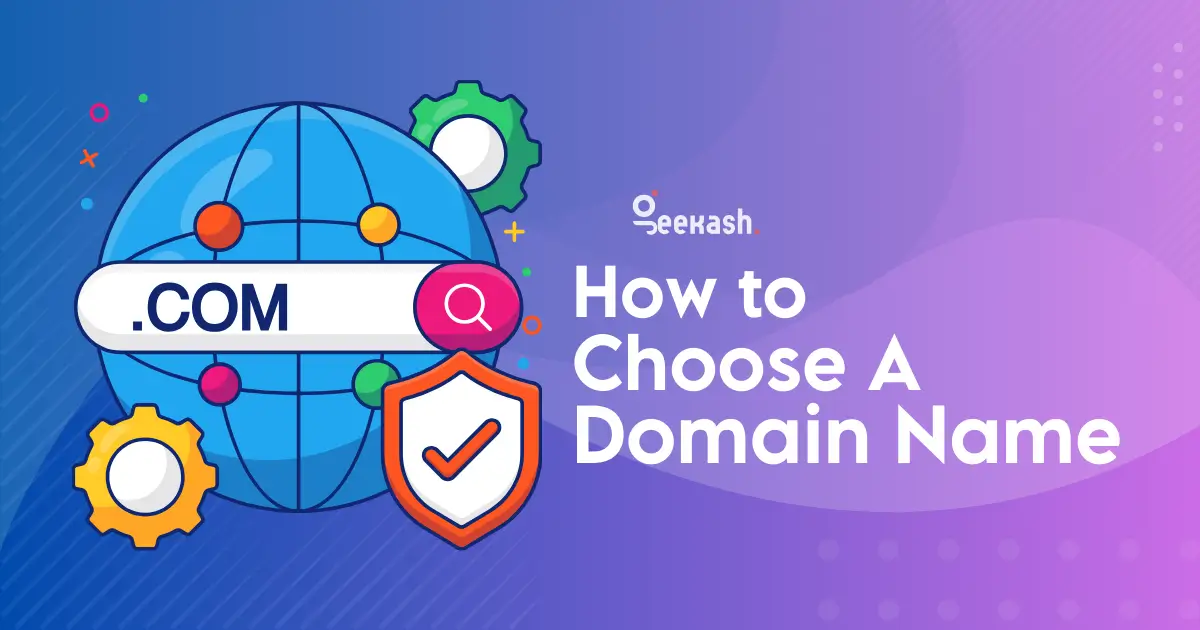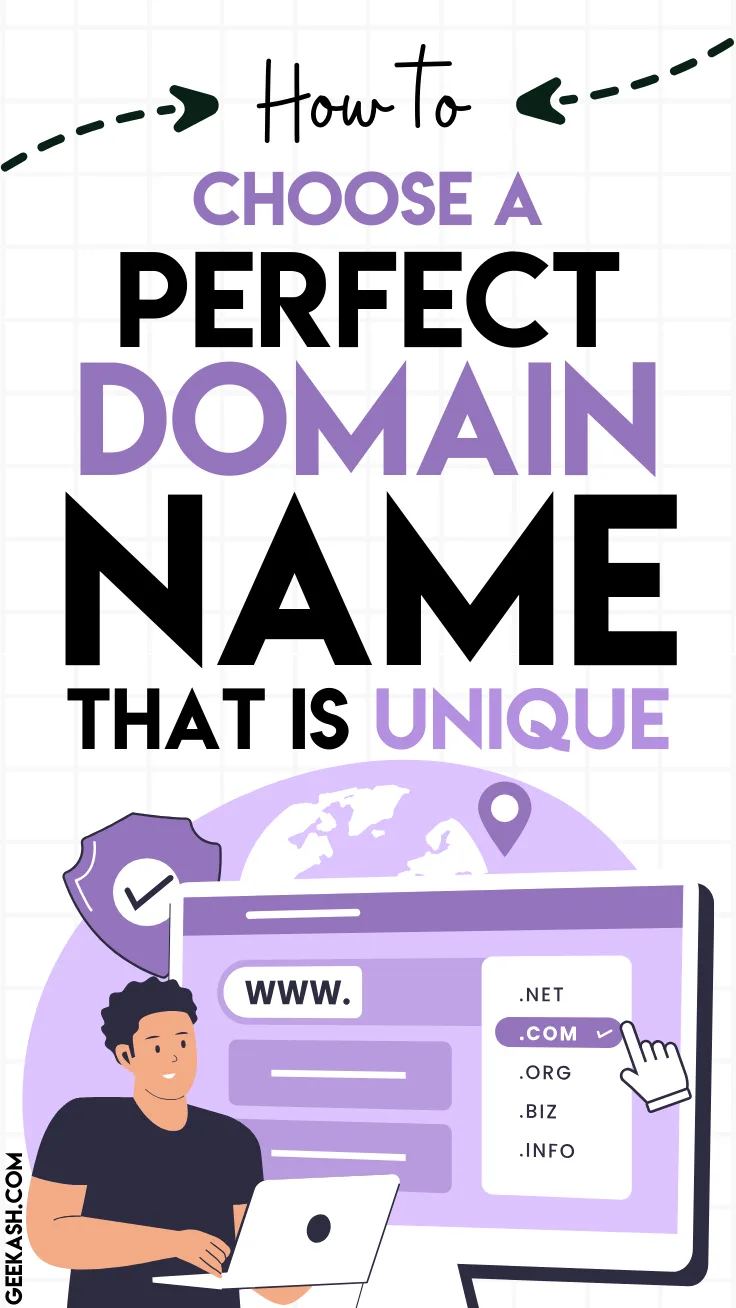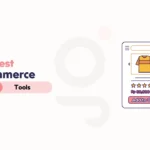Did you know that 77% of the most memorable domain names are 16 characters or less? Businesses still choose long, complicated domains that customers can’t remember.
At first glance, a domain name seems like a simple choice. However, this decision shapes your entire online presence. Your domain name serves as more than just a web address—it creates your first digital impression, defines your brand’s identity, and often becomes your customer’s first point of contact.
Look at the websites you visit every day. Amazon.com, Google.com, and Facebook.com stand out as short, memorable, and easy-to-remember names. These companies didn’t pick these names by chance. Their careful choices helped build massive digital empires.
Want to choose a domain name that makes your business unique? Let’s explore proven methods for selecting a memorable, brandable domain name that fits your business perfectly.
Why is Domain Name Important?
Your domain name is the lifeblood of your online presence and forms the foundation of your digital identity. Studies show that choosing the right domain name can boost revenue by up to 23% through consistent multi-platform branding.
Building Trust and Credibility The digital world demands trust, with 81% of consumers needing to trust a brand before buying. Your domain name plays a vital role in establishing this trust. A domain name that matches your brand doesn’t just create an address – it builds a foundation for customer confidence.
Here’s why your domain name matters more than you might think:
- Establishes your brand’s online identity and first impression
- Creates a professional email presence for your business
- Protects your brand from potential impersonators
- Boosts search engine visibility and organic traffic
- Provides scalability for future business growth
Strategic Impact on Your Business: Your domain name affects many parts of your online success. Direct navigation traffic, which happens when customers type your domain directly into their browser, can bring more value than search engine traffic. This direct connection between you and your customers removes the need for expensive advertising intermediaries.
These strategic factors matter when choosing your domain name:
- Search Engine Optimisation (SEO)
- Brand Protection
- Professional Communication
- Future Scalability
- Market Credibility
Digital Asset Value: Your domain name works as a digital asset that grows in value over time. Securing relevant domain names early stops others from capitalising on your brand’s success. This approach becomes especially important as your business grows and evolves.
Professional Identity: A custom domain lets you create professional email addresses using your domain name, which substantially affects how potential clients see your business. This professionalism can make the difference between winning and losing a potential customer.
Search Engine Benefits: Domain names don’t directly affect rankings, but they influence your SEO success in subtle ways. A clear, descriptive domain name helps users identify your business easily and can improve your chances of ranking higher in search results.
Brand Protection Strategy: Registering variations of your domain name creates what experts call a “defensive perimeter” – a digital moat around your brand. This strategy lowers the risk of brand infringement and protects your online identity from threats.
Future-Proofing Your Business Your domain name should support your growth as your business evolves. Your domain name plays a vital role whether you expand into new markets, launch new products or rebrand. This isn’t just about your business today – it’s about your tomorrow’s vision.
Note that your domain name often gives customers their first impression of your business. It’s more than just a web address; it represents your brand’s online identity and serves as a vital element in your digital marketing strategy.
How to Choose a Domain Name
A perfect domain name needs strategic thinking and careful planning. Let’s head over to the essential steps that will help you pick a domain name to serve your business well in the years ahead.
1. Use a .com extension
Selecting a ‘.com’ domain extension is the best choice for several compelling reasons. The ‘.com’ extension is the most widely recognized and trusted internet domain, instantly granting credibility to your blog or online presence.
One of the primary advantages of a ‘.com’ domain is its global appeal and familiarity. While extensions like ‘.net,’ ‘.org,’ and industry-specific options like ‘.blog’ or ‘.co,’ are available, ‘.com’ remains the most universally known and preferred domain.
This widespread recognition reduces the risk of potential visitors mistakenly accessing an unrelated or competing website by typing the ‘.com’ version of your domain.
Successful companies and renowned brands prioritize securing a ‘.com’ domain for this reason. Choosing a ‘.com’ extension is a strategically sound decision, as it offers unparalleled global recognition and trust, ultimately minimizing the chances of your audience inadvertently landing on the wrong online destination.
2. Research your Desire Domain Name
Once you choose a domain name for your business, it is crucial to verify whether the domain is already registered. You can use Hostinger domain name search to check the availability of your desired domain. Additionally, conducting a WHOIS lookup is a common method to research domain ownership.
Before committing to a domain name, it is crucial to ensure that no other organisation is using a similar name. There are three effective ways to conduct this check:
- Firstly, you should perform a trademark search on the United States Patent and Trademark Office (USPTO) website to ascertain whether a comparable name has been registered as a trademark.
- Secondly, it is advisable to search across popular social media platforms, such as Instagram, Facebook, and TikTok, to verify the availability of your preferred name. This step will also prove beneficial when you commence your social media marketing efforts.
- Lastly, conducting a Google search for your desired name will help you identify if another domain is closely associated with your brand. By following these steps, you can be confident that your chosen domain name is unique and aligned with your business’s identity.
3. Keep it Short and Simple
When you choose a domain name for your online presence, simplicity is key.
A straightforward, concise, and memorable domain name not only makes it easier for visitors to type and share but also leaves a lasting impression, enhancing brand recognition and encouraging repeat visits.
One key principle to consider when you choose a domain name is to avoid complicated terminology, numerical figures, or hyphens. These elements can confuse your audience and lead to errors when attempting to access your website.
For instance, a domain like ‘My-Blog4You.com’ runs the risk of visitors forgetting the hyphen or the number, potentially directing them to an unintended destination. Ideally, your domain name should be kept under 15 characters, excluding the extension. A brief and catchy name is more easily remembered and typed, increasing the likelihood that your audience will return to your site.
A prime example is ‘BuzzFeed.com,’ a short and memorable domain that immediately conveys the engaging, buzz-worthy content the website offers. By adhering to these principles, you can create a domain name that is not only visually appealing but also highly functional, making it easier for your audience to discover and engage with your online presence.
4. Have a Brandable Domain
A brandable domain name goes beyond merely describing the purpose or keywords of your blog. It should be unique, memorable, and stand out from the competition.
A brandable domain does not necessarily have to be literal or generic; instead, it should evoke a particular feeling, be descriptive, and align with the identity of your brand.
For instance, the domain ‘google.com’ does not directly relate to search engines, but over time, it has become synonymous with web searching. The name is short, catchy, and brandable, making it easily recognisable and distinguishable from other services.
When creating a brandable domain name for your blog, it is advisable to aim for something that represents the voice and personality of your brand. The domain should be concise, straightforward, descriptive, and capable of growing alongside your blog as it expands.
For example, if you are launching a fashion blog, instead of choosing a generic name like ‘FashionBlog.com,’ you may consider a more creative option like ‘GlamHeaven.com.’
Ultimately, a brandable domain name is a crucial element in establishing a strong and memorable online presence for your blog, as it can help to differentiate your offering from the competition and foster a lasting connection with your target audience.
5. Avoid Double Meaning
When you choose a domain name, it is crucial to be mindful of potential double meanings and unintended connotations.
A domain that appears straightforward at first glance may inadvertently convey a different or inappropriate message, which could confuse and alienate your target audience.
This is particularly important to consider, as domain names lack spaces, making it easy for words to blend together and create unintended interpretations. For example, the domain ‘speedofart.com’ may be intended to showcase artistic endeavours, but when read together, the words can be mistakenly interpreted as ‘Speedo Fart,’ which could undermine the professionalism and intended message of the website.
To avoid such pitfalls, it is advisable to carefully analyse your proposed domain names for any unintended or inappropriate meanings. Seeking feedback from others who may identify potential issues that you had not considered can be a valuable step in this process. Additionally, it is prudent to exercise caution when using domain name generator tools, as they may not always account for these nuanced considerations.
By being proactive and diligent in how you choose a domain name, you can ensure that your online presence effectively communicates your intended message and maintains a professional, appropriate tone that resonates with your audience.
6. Avoid Hyphens and Numbers
When you choose a domain name for your website, it is advisable to avoid using hyphens and numbers, as these elements can make your web address more challenging to remember, type, and share with others.
The inclusion of hyphens in a domain name can hamper effective verbal communication. For instance, if you were to inform a friend about a blog with the domain ‘my-cooking-blog,’ you would need to clarify the presence of the hyphens, which could lead to confusion. Visitors are more likely to forget the hyphen or mistakenly type the URL, potentially directing them to the wrong site and causing frustration.
Also, the use of numbers in a domain name can create confusion, particularly when it is unclear whether the number should be written as a digit or spelt out. Consider a blog with the domain ‘FiveStarChef.com‘; this could be incorrectly typed as ‘5StarChef.com‘ or vice versa, leading to unintended outcomes.
Therefore, it is crucial to avoid incorporating hyphens and numbers when choosing a domain name to ensure a more user-friendly and professional brand presence. By following this guidance, you can enhance the memorability and ease of use for your website’s address, ultimately contributing to a more positive user experience.
7. Keep It Below Four Syllables
Choosing a domain name with four syllables or fewer is a savvy strategy that can significantly enhance the user experience. Shorter names are far more effortless to pronounce, recall, and type, which is crucial for the success of your website.
Longer domain names can feel cumbersome and impede the user’s ability to remember them, whereas concise options with fewer syllables create a smoother, more seamless interaction. Take, for instance, the phrase ‘Life Hack‘ – with its two-syllable structure, it is infinitely more accessible than a lengthy alternative like ‘SuperPersonalGrowthBlog.com‘.
Adopting a concise domain name also reduces the risk of spelling errors, particularly when users hear the name spoken aloud. This attention to detail can have a significant impact on how readily your website is discovered and embraced by your audience.
In conclusion, maintaining your domain name under four syllables is a subtle yet impactful strategy that can greatly enhance the overall user experience and accessibility of your website. Investing in a concise, memorable name is a small but powerful step towards ensuring your website’s success and visibility in the digital landscape.
8. Scalability
Scalability is a crucial consideration when you choose a domain name. A scalable domain name allows you to expand your content offerings or business without the need for a rebrand or domain change, which can disrupt your audience and impact your search engine optimization (SEO) efforts.
For instance, if you start a blog with a domain name like ‘FitnessTipsForTeens.com,’ it confines your content to a specific niche – fitness advice for teenagers. While this may be suitable initially, what if you later wish to broaden your focus to include fitness guidance for adults and seniors? Your original domain would no longer be appropriate, and you would either have to maintain a narrow audience or undergo a rebranding process, which can confuse your readers and negatively affect your site’s visibility.
Alternatively, choosing a scalable domain name like ‘FitLife.com’ provides greater flexibility for the future. Although you may initially target teenagers, the broader name allows you to expand your content to cater to a wider range of audiences, from beginners to fitness enthusiasts of all ages.
A scalable domain name leaves room for growth without limiting the scope of your content offerings. This strategic approach can help ensure the long-term success and adaptability of your online presence.
9. Avoid Legal Conflicts
When you choose a domain name for your blog, it is important to be mindful of potential legal complications, particularly those involving trademarks.
Trademarks serve to protect a brand’s identity and intellectual property, and if you inadvertently include a trademarked word or phrase, the rightful owner can take legal action against you.
For instance, even if you use a term like ‘Nike’ in your domain name, but in a different industry, you run the risk of infringing on the company’s trademark rights. This can lead to the forfeiture of your domain name, the imposition of fines, or even more severe legal consequences.
Therefore, before securing a domain name, it is important to thoroughly research whether the name you desire is already trademarked. You can accomplish this by searching government databases, such as the United States Patent and Trademark Office (USPTO), or by using online tools that enable you to search for registered trademarks globally.
To safeguard yourself, it is advisable to use original or modified names that do not infringe on trademarks. Not only does this help you avoid legal issues, but it also enhances the distinctiveness of your brand. In addition to prioritizing originality, you should consider obtaining a trademark for your domain name if it is unique and an integral part of your growing brand.
This action provides you with legal protection, reinforcing the strength and integrity of your brand and also ensures no one else can use your name without consequences.
Your domain name represents a long-term investment in your brand’s future. Take time to assess all options and buy multiple variations of your chosen domain to protect your brand identity.
Domain Name Generator
Domain name generators have transformed the way we find available domain names. AI-powered tools make this task quick and simple.
A domain name generator automates the creative process of finding your ideal domain. These smart-systems look at your keywords and priorities to suggest available names that match your brand’s vision.
Key Features of Modern Domain Generators:
- AI-powered suggestions based on your keywords
- Instant domain availability checking
- Multiple TLD (Top-Level Domain) options
- Brandability assessment
- Social media username verification
The best domain name generators mix advanced algorithms with real market data to give you relevant options. These tools check availability with multiple registrars and add features that help you make smart choices.
1. Looka
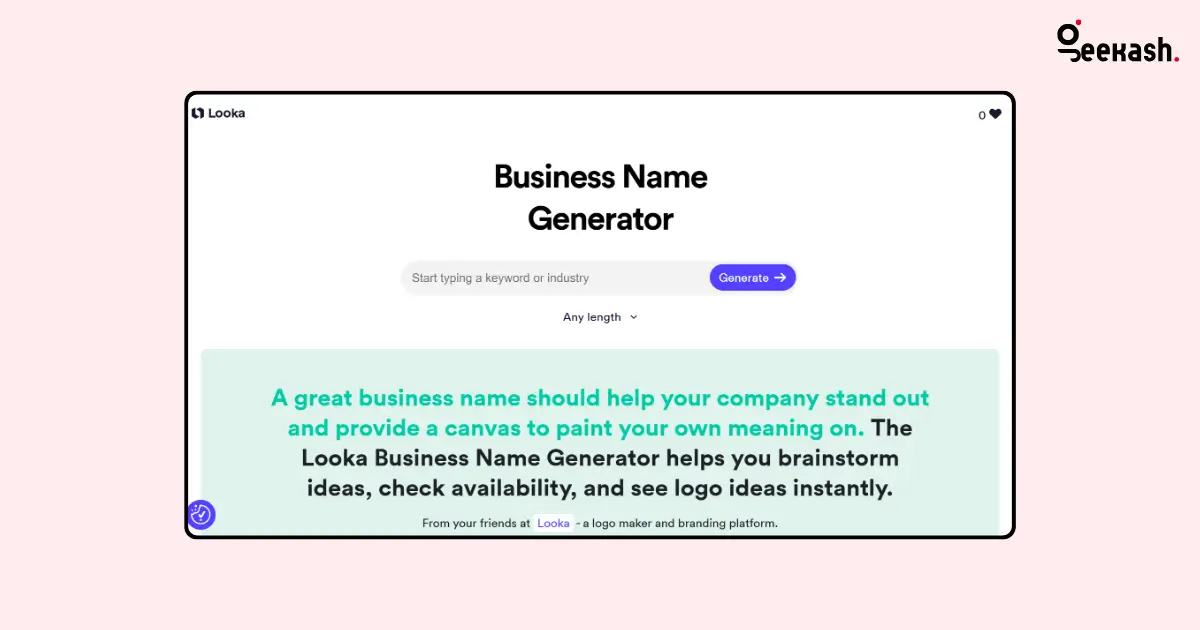
Looka’s Business Name Generator is a powerful tool that can generate dozens of business names inspired by abstract ideas (such as creativity) and industry-specific themes. The generator automatically verifies the availability of domain names and social media handles, and if they are unavailable, it offers alternative suggestions. Additionally, the tool provides a selection of logo designs to help you establish your website swiftly and efficiently.
2. IsItWP
The IsItWP domain name generator is a simple and fast tool designed to assist individuals in transforming a brand name and associated keywords into a unique and effective domain name. Furthermore, the tool is seamlessly integrated with BlueHost, enabling users to promptly register their desired domain name for free, provided they choose BlueHost as the hosting platform for their website.
3. Nameboy
Nameboy, the oldest domain generator on the internet, is a trusted and popular source for finding unique domain names. Simply enter one or two keywords, and Nameboy will generate a list of distinctive options for you to select from. Additionally, Nameboy offers specialised generators for blog names, brand names, and business names, which could complement your search for the perfect domain name.
4. Instant Domain Search
Instant Domain Search is a user-friendly option that generates domain name suggestions as you type. This domain generation tool displays available domains as well as those that are currently taken but can be purchased.
These generators simplify your domain search by automating what used to take hours of manual work. AI technology uses your keywords to create valuable options that could boost your future traffic.
Making the Most of Domain Generators:
Try different keyword combinations related to your business when using these tools. Better results come from more details about your business, idea, or hobby. Many generators create unique combinations with various domain extensions.
Today’s domain generators offer more than just name ideas. Extra features include:
- Trademark checking capabilities
- Social media handle availability
- Brand name analysis
- Local domain suggestions
- Premium domain options
Advanced Features to Look For:
Top domain name generators let you check up to 20 domains at once with bulk search. They suggest keyword-rich domains that match your business goals and save time in the brainstorming phase.
Some generators focus on specific areas like:
- Blog name generation
- Store name suggestions
- Podcast domain ideas
- Startup naming solutions
These tools organise suggestions by name formation patterns. This makes finding the right name easier. Many also check if your chosen name works across social media platforms to keep your branding consistent.
Note that domain name generators serve as inspiration rather than decision-makers. Use them as a starting point in your domain selection experience, and combine their ideas with the naming principles covered in earlier sections about memorable and brandable names.
Buy Multiple Domain Names
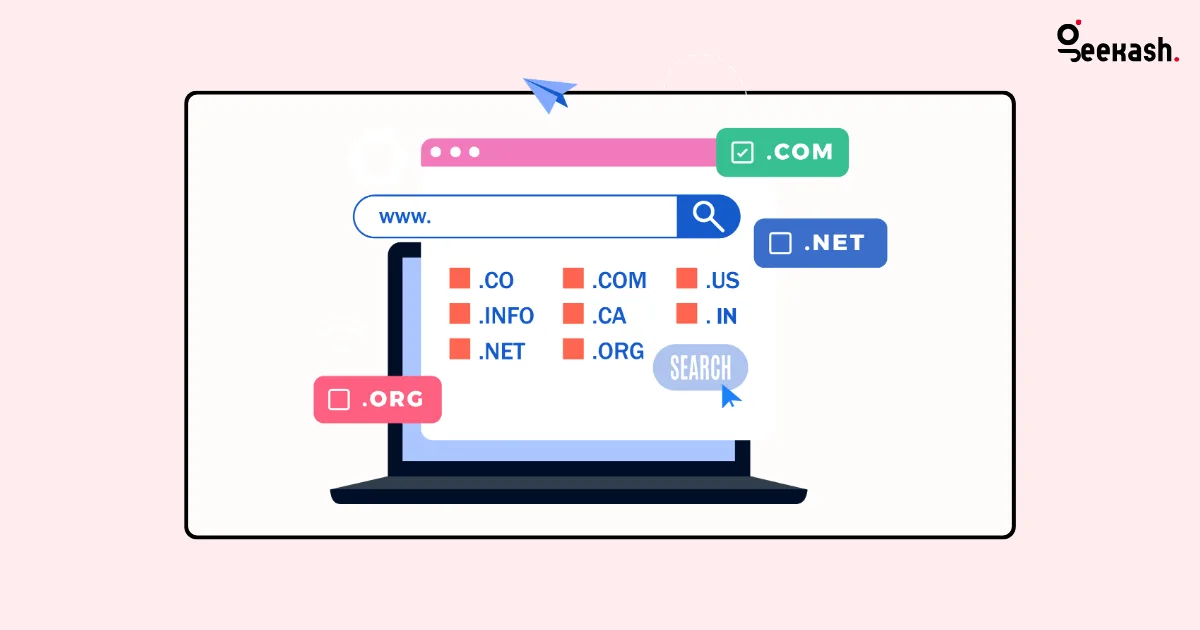
Statistics show that 33,000 new domains are registered daily, making multiple domain name investments a significant strategy in today’s digital world. This strategy extends beyond securing your main web address.
Strategic Benefits of Multiple Domains: Approximately 37% of all registered domains are .com extensions, but your domain strategy needs more depth. Here’s why you should expand your domain portfolio:
- Brand Protection and Security
- WIPO reports over 67,625 cybersquatting cases since 1999
- Guards against trademark infringement
- Secures common misspellings of your brand
- Improved Market Presence
- Captures type-in traffic from various sources
- Boosts geographic targeting capabilities
- Strengthens niche market positioning
- Marketing Flexibility
- Enables targeted promotional campaigns
- Supports product-specific websites
- Helps market segmentation
Managing Your Domain Portfolio: Internet users have added 13.2 million new domains over the last several years, showing a 3.9% increase. Centralised management is vital to handle multiple domains effectively. Here’s what you need to do:
- Buy domains from one provider to simplify administration
- Create consistent renewal schedules
- Set up proper forwarding and redirect rules
- Keep branding standard across all domains
Cost Considerations and ROI: Forbes estimates each domain costs between USD 10.00 and USD 20.00 yearly. Think of this as an investment rather than an expense. Buying domains proactively costs much less than acquiring them later from cybersquatters.
Domain Forwarding Strategy: A smart forwarding strategy maximises your multiple domains’ value:
- Set up 301 redirects to forward permanently
- Configure domain aliases to manage email
- Build clear hierarchies for your domain structure
Advanced Domain Management Tips: You can include up to 600 domains under one account. Strategic planning helps manage them effectively:
- Keep branding consistent across all domains
- Use proper redirects to avoid duplicate content
- Park domains you’ll use later
- Track each domain’s performance
Protecting Your Digital Assets: Big companies show why complete domain portfolios matter. To cite an instance, Nike owns over 4,000 registered domain names, and Apple maintains more than 6,000. Your business might not need thousands of domains, but securing key variations remains vital.
Domain Portfolio Optimisation: Your domain portfolio expansion should focus on:
- Registering common misspellings and typos
- Securing relevant country-code top-level domains (ccTLDs)
- Protecting brand-related keywords
- Reserving domains for future growth
Technical Considerations: Proper technical setup matters when managing multiple domains:
- Configure DNS records correctly
- Set up SSL certificates
- Establish email forwarding rules
- Add tracking and analytics
Future-Proofing Your Domain Strategy: Your domain strategy should evolve with your business growth. Think over these factors:
- Market expansion opportunities
- New product launches
- Geographic targeting needs
- Brand protection requirements
Domain management focuses on quality over quantity – it must line up with your business goals. Your domain portfolio should meet current needs while staying flexible for future growth. A complete domain strategy protects your brand and creates opportunities to reach more markets and boost customer participation.
Conclusion
Your domain name is a vital decision that will shape your online success. It’s more than just a web address – it’s your digital identity that builds trust, improves brand recognition, and brings direct traffic to your business.
A winning domain name needs several core elements. Keep it short and memorable. Use .com extensions whenever you can. Stay away from hyphens and numbers. Make sure it can grow with your business. Domain name generators help streamline your search. Getting multiple relevant domains will protect your brand from competitors.
The domain name you pick today will affect your business success tomorrow. Take time to get the full picture and think over all naming options. Protect your brand by registering key domain variations. These strategies and tools will help you pick a domain name that makes your business shine online.

